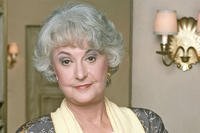The Life of Dan Blocker
On the TV show "Bonanza," Dan Blocker played the large, affable Eric "Hoss" Cartwright. At 6 foot 4 and, at certain points, well over 300 pounds, Blocker fit the part perfectly and by all accounts was "the most likable cast member" on the show.
But less than a decade before the blockbuster series' NBC debut, some North Korean soldiers near Hill 223 were watching a very different man. They saw 1st Sgt. Dan Blocker, who was defending the area along with other members of the "Thunderbirds" of the famed 45th Infantry Division.
Blocker, aka "The Big 'Un," was always a big, soft-hearted guy.
Born Bobby Dan Blocker in DeKalb, Texas, in 1928, he weighed in at a staggering 14 pounds. As a young boy, he was called "Bob." His parents were both native Texans, although with family roots in the Deep South.
When he was 4, his 11-year-old sister Ora died, after which he grew up as an only child.
His father owned a general store after the family moved to tiny O'Donnell, Texas. Blocker was a young boy when he began working at his father's store.
He attended Sul Ross State University, a small public university in Alpine, Texas. There, he played football but didn't care much for it. He also took part in a school play and discovered acting was "kind of fun."
Although he portrayed a dim-witted giant, Blocker was a thoughtful intellectual.
A one-time teacher, he was working on a Ph.D. when he dropped out to pursue his acting career, in large part because he had a family to support. He had begun making decent money with the Jane Wyman theater, plus he landed a role on TV's "Gunsmoke."
He completed a master's degree in drama in 1950, before being drafted into the Army and beginning to fight in Korea the next year.
Dan Blocker's Military Service
Blocker, a combat infantry sergeant, was assigned to Company F, 2nd Battalion, 179th Infantry Regiment, 45th Infantry Division. (It took the Army a month to get him boots in his size: 14.5.)
After landing at Inchon, he was on the front lines by Christmas Day 1951 and spent nearly a year there.

He and his men took positions in Chorwon, in what is today North Korea. They were manning the Jamestown Line as the war settled into a virtual stalemate of taking and retaking hills, static fortifications and trenches along the line.
For 209 days, Blocker and the 179th Infantry Regiment were in heavy fighting. He was wounded in action while coming to the rescue of his fellow soldiers -- something good ol' Hoss Cartwright might do.
Between December 1951 and June 1952, the 179th and 180th Infantry Regiments fought over Pork Chop Hill, a key piece of terrain that was critical to holding Old Baldy, which overlooked the entire area. By summer 1952, the fighting heated up, along with the weather.
The 179th was taken off the line in July 1952, and Blocker finally was sent to the hospital to recover from his wounds. His unit went into reserves, and by August of that year, he was headed home with a Purple Heart.
A liberal Democrat and adversary of war, he once decried U.S. taxpayer money "being used to drop napalm on people in Southeast Asia."
Dan Blocker's Acting Career
Blocker, of course, would eventually become world famous for his portrayal of one of Ben Cartwright's sons on the Ponderosa Ranch during the gold-rush days.
But immediately upon his return to the U.S., acting wasn't his first choice. However, he did want to move to Los Angeles. After the war, in 1952, he married his 5-foot-3 college sweetheart, Dolphia Parker, nicknamed Dolph. They had four children, including twin daughters Debbie and Danna, followed by sons David and Dirk.
Acting found him not long after his move to California, as he was pursuing his doctorate at UCLA.
Industry casting scouts spotted Blocker standing in a phone booth, dressed like the big Texan he was. Television Westerns were wildly popular at the time, and Blocker looked the part.
"'Being big has its advantages, especially when you're doing the rounds of the agents' offices. They don't forget you in a hurry," Blocker said.
The newly minted actor was cast in a slew of Western shows, including parts on episodes of "Gunsmoke" and "Colt .45."
These minor TV roles continued steadily throughout the mid- to late 1950s, as he appeared in one or two episodes each of several series, including "The Rifleman," "Have Gun - Will Travel" and "Maverick."
He also was cast in a few film roles, but preferred television.
A modest breakthrough came in 1957-58, when he was cast in five episodes of "The Restless Gun," a TV series about a cowboy in the post-Civil War era.
Not long after that, he appeared in 15 episodes of "Cimarron City," about an oil and gold boomtown in the future Oklahoma. He took on the role of Tiny Budinger, a goofy ranch hand.
Hoss Cartwright on 'Bonanza'
Blocker's fate was sealed when, at the show's inception in 1959, he was cast to play the regular role of the lumbering but shy Hoss Cartwright on "Bonanza."

It was the longest-running TV Western after "Gunsmoke" and one of TV's highest-rated shows throughout the 1960s.
He was on for 13 of the 14 seasons of the full-color series, which was filmed at Hollywood's Paramount Studios and in the mountains of Nevada and Northern California.
The Hoss character was a son of a wealthy Nevada rancher, portrayed by Lorne Greene. Michael Landon played Hoss' younger brother, "Little Joe," and Pernell Roberts portrayed his older brother, Adam, for the series' first six seasons.
"Hoss" is a nickname for both the character, and a general term for big, friendly guys in the rural areas of the Rocky Mountains. Since "Bonanza" took place in an area near Lake Tahoe, the moniker was perfect for a man of Blocker's size.
The show became a cultural touchpoint, enormously popular not only in the U.S. but across the globe, broadcast to hundreds of millions of viewers in dozens of countries.
At one point in the 1960s, Blocker was considered the world's best-known actor.
Dan Blocker and the Price of Fame
Like many superstars, Blocker lamented the loss of privacy that came with being famous. Everywhere he went, the giant was mobbed.
When "Bonanza" was in its third year, a family outing to a baseball game with his young sons, Dirk and Dave, was ruined when people in the grandstand hounded the giant TV star for autographs. It got so bad, Blocker said, he had to take his kids and leave, never getting to see the game.

Even when he tried to escape to the Yucatan in Mexico for a getaway with his wife, he was followed by locals calling after him: "Caballero!" and "Hoss!"
Near the end of his life, he even went so far as to move his family to Switzerland to try to enjoy some peace and anonymity.
"Like money or health, we don't appreciate the value of privacy until we've lost it," he said in 1967.
Blocker also expressed ambivalence about the enormous wealth he accrued from his acting paychecks and his investments, calling the enormity of his earnings "absolutely immoral."
"Let's face it, I sold out," he said. "For money."
He lamented that regular working people like teachers had a much harder and more important job than his, and should be paid much more.
In the early 1960s, he even tried to get back into teaching, but the principal at his former school told him to forget it. "You'll always be Hoss," his ex-employer declared.
Until 1969, Blocker lived relatively modestly in Northridge, a neighborhood in the San Fernando Valley region of Los Angeles that was a comfortable distance from the Hollywood scene. It was only when he'd been "Hoss" for several years that he moved the family to an eight-bedroom mansion.
A racing-car enthusiast and self-proclaimed expert on internal combustion engines, he was president of Vinegaroon Motor Racing, which built Grand Prix cars. Too large to actually fit inside the cars, he was satisfied with working on them in the pits.
He was also a part owner of the Bonanza Steakhouse restaurant chain, which later closed due to financial problems.
Death of Dan Blocker
Blocker, 43, died suddenly after suffering two pulmonary embolisms following gallbladder surgery in May 1972.
His wife of 20 years, and one of his daughters, were by his side when he died.
He was buried in a private ceremony outside his hometown of DeKalb, Texas.
After his death, the president of NBC said in a statement that Blocker had "brought to his personal life the same high moral character of the role he played."
Some details of Blocker's life are showcased in an exhibit at The O'Donnell Heritage Museum in O'Donnell, Texas, the town where he was raised from age 6. A park in O'Donnell also proudly displays a bust of the actor.
Want to Know More About Veteran Jobs?
Be sure to get the latest news about post-military careers as well as critical info about veteran jobs and all the benefits of service. Subscribe to Military.com and receive customized updates delivered straight to your inbox.

















